East-South Africa Agri Forum
Agricultural Counsellors in East and South Africa are contributing to more sustainable business in amongst others horticulture, animal feed, dairy and potatoes. As part of these efforts, the Agricultural Counsellors at the Netherlands Embassies in Ethiopia, Uganda (also covering Rwanda), Kenya (also covering Tanzania), and South Africa initiated a two-day program focused on informing interested parties in The Netherlands about the main business opportunities, policy developments, local needs such as knowledge & skills gaps, needed innovations and challenges related to horticulture and livestock within their respective countries.
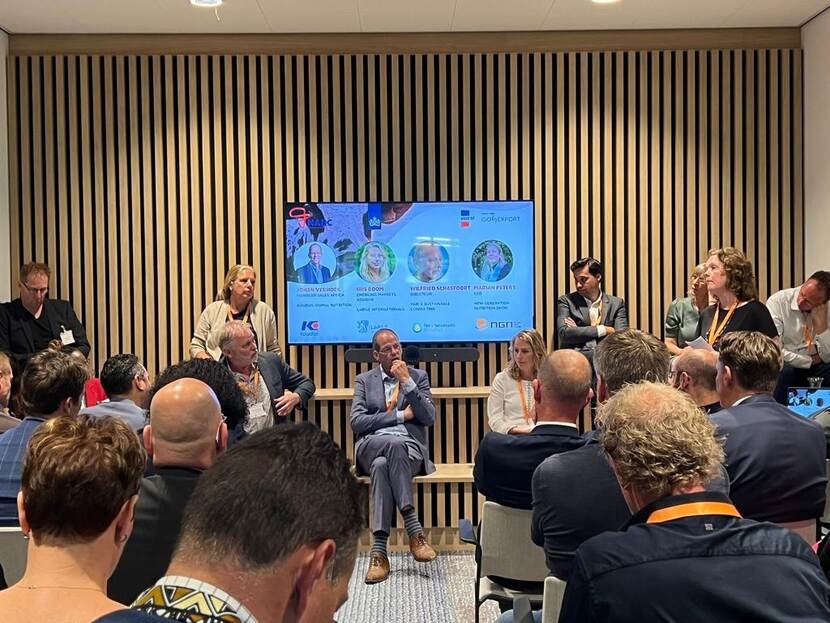
Interest from the Dutch sector
The Netherlands Enterprise Agency (RVO) requested the Netherlands-African Business Council (NABC) to support the execution of the two-day program which consisted of the East-South Africa Agri Forum that took place in Omnia-Wageningen Campus on the 6th of June 2023 and the Speaking Day in WTC Tower Utrecht on the 7th of June 2023. There was overwhelming interest from the Dutch sector for these events which showed the huge demand for a regional well focused agrifood event. It made it hard though to capacitate everyone. Around 120 participants were admitted but there was much more interest.
The Forum was opened by Rosmarijn Fens (Managing Director of the NABC) -who was also the moderator of the Forum-, and Fons de Zeeuw (Director International of Oost-NL). The welcome speech was done by Ralf van de Beek (Director International Agribusiness and Food Security of the Ministry of Agriculture, Nature and Food Quality).
The Forum proceeded with presentations from the Dutch Agricultural Counsellors during which the challenges and opportunities within horticulture and livestock in East and South Africa were outlined.
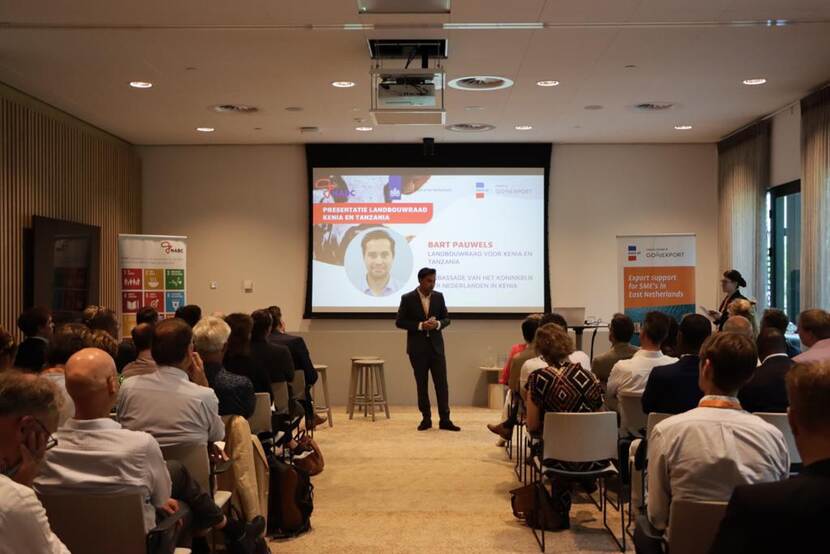
Key takeaways from the Agricultural Counsellor in Kenya
Some key takeaways from the presentation of Bart Pauwels, the Agricultural Counsellor in Kenya (also covering Tanzania):
- In Kenya, an important focus of the agriculture office is on more sustainability with regards to transport, water usage, and living wages. In the big Dutch flower sector but also beyond that in other sectors. The dairy market in Kenya is gradually opening up. Support will also be given in niches where The Netherlands has a lot to offer, like for example feed and potatoes.
- The Netherlands Embassy has good relations with the Tanzanian Ministry of Agriculture. Development in the potato sector is encouraged by the Tanzanian government. This offers opportunities with already existing interest from Dutch seed companies. For animal feed companies there are also opportunities to enter the market with investments and innovations that can improve quality and reduce price. Finally, the Dar es Salam port surpassed the Mombasa port in terms of volume. There are also clear geopolitical shifts with a lot of interest from China and India (avocado charters), among others. It was noted that in the first quarter of 2024, there will be an incoming mission of the Minister of Livestock of Tanzania to the Netherlands.
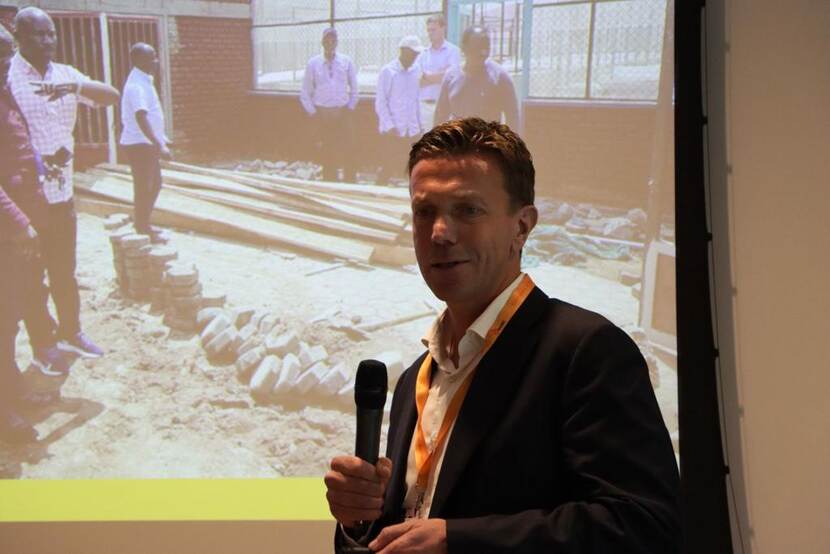
Key takeaways from the Agricultural Counsellor in Uganda
Key takeaways from the presentation of Frank Buizer, the Agricultural Counsellor in Uganda (also covering Rwanda), were as follows:
- Both Uganda and Rwanda, are stable, English speaking, and landlocked countries that are easily accessible for foreign companies. A key development in Uganda includes the recently passed anti-homosexuality law which is putting NGOs and CSOs under pressure. With regards to Rwanda, it is a planned economy and the government plays a vital role in the society at large.
- In both countries, regional market development is of priority and currently is dominated by small businesses and farmers with a few larger companies active as well (i.e., Unilever, DSM, and Heineken active in Rwanda and in Uganda big animal feed factory investments). Major agro-products include coffee, tea, oil seeds, and cotton, among others. A rise in dairy, horticulture, and fish farming has been noted. In Rwanda and Uganda, there is plenty of primary production and offers opportunities for plant cuttings companies. For the Embassy, food security in Uganda is currently a priority. There will be another agrifood trade mission to Uganda in February 2024 during the biggest regional agricultural fair in Kampala, called the Harvest Money expo.
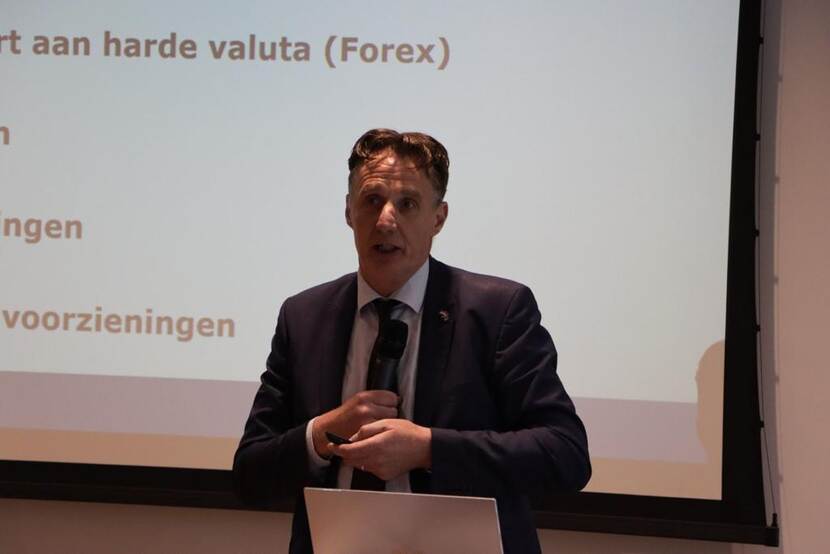
Key takeaways from the Agricultural Counsellor in Ethiopia
Key takeaways from the presentation of Meeuwes Brouwer, the Agricultural Counsellor in Ethiopia, were:
- Ethiopia is experiencing ethnic tension and security challenges. Conflict has cost a lot of money, resulting in FOREX shortages. Investors need to repay loans, but the question remains of how precisely to do so with no hard currency. In addition, there are also limited infrastructure facilities. However, Ethiopia does have huge potential with existing Dutch companies in Ethiopia continuing to invest. There is a need for higher quality inputs, technology, and practical knowledge, as well as, for the promotion of responsible business conduct and sustainability. The key focus in the country is on horticulture, but dairy, poultry, and agro-logistics remain of high importance. Brouwer concluded by mentioning the following relevant agricultural projects in Ethiopia that might provide interesting entry points:
- Ethiopian - Netherlands Seed Program.
- HortiLIFE (input, storage, processing, IPM, etc.).
- BRIDGE Dairy (inputs, machinery, processing, food safety, etc.).
- Flying Swans and CBI Fruit & Vegetables (agro-logistics).
- Food safety, quality and phytosanitary knowledge.
- Stand in Dutch Pavilion at Livestock ALEC-2023
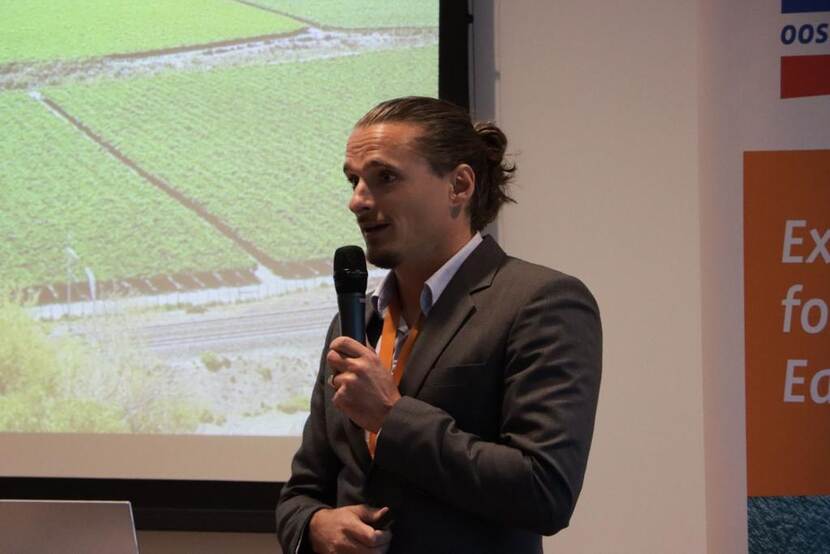
Key takeaways from the Agricultural Attaché in South Africa
Finally, the key takeaways from the presentation of Emiel Mulder, the Agricultural Attaché in South Africa, were:
- For South Africa, climate smart agriculture, especially agro-logistics, is of a big priority.
- Major export products include maize, wine, avocados, and citrus. Agricultural exports in 2022 reached EUR 12 billion with 164 million boxes of citrus exported in 2022.
- There has been growth in horticulture (up by 130k ha. in last decade). In addition, 50%-60% of available water is used for agricultural purposes.
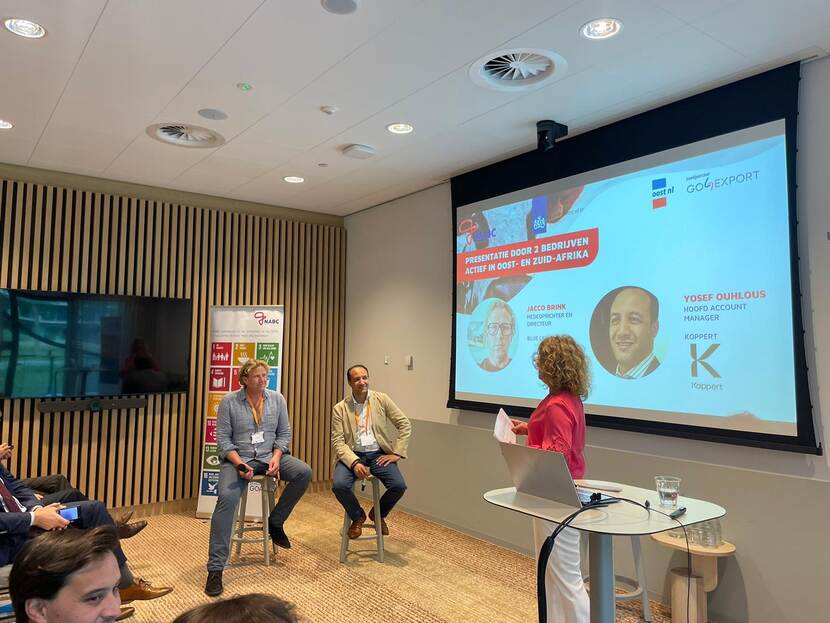
Plenary keynote
The plenary concluded with Rosmarijn Fens interviewing representatives of two Dutch companies about doing business in the region. These were: Mr. Yosef Ouhlous (Head Account Manager at Koppert Biological Systems) and Jacco Brink (Co-Founder and Director of The Blue Link). The key points discussed were:
- Technology should match the needs and skills available in the specific country. It is always good to work with local universities and knowledge institutes.
- Doing business in certain countries can be challenging. Therefore, prepare for the worst and hope for the best, go for long term, be committed and treat people fairly (similar standards and values as in The Netherlands: pension accrual, health insurance, fair salary).
The main lessons discussed were to always look for solutions based on market needs, be flexible and do not forget how important culture is (“culture eats business for breakfast”).
Thematic breakout sessions
The East South Africa Agri Forum featured two rounds of two simultaneous thematic breakout sessions on the following four sustainable business and policy themes:
- Creating a sustainable potato value chain.
- Contributing to agro-logistics systems in horticulture.
- Creating a sustainable dairy value chain.
- Sourcing and protein transition to optimize feed production.
Thematic session 1: the future of the Dutch potato in East and South Africa
The breakout session on the Future of the Dutch Potato in East and South Africa was moderated by Karst Weening, the Policy Officer International Affairs of the Dutch Potato Organization (NAO) and featured the following speakers:
- Peter Gildemacher, Senior Advisor Sustainable Economic Development at Royal Tropical Institute.
- Michel de Bruin, Manager Business Innovation and Development at Agrico.
- Willem Schoustra, the Director of SeedNL.
- Ludo van Lanschot, the Investment Manager at VERIS Investments.
Potatoes have a lot of potential because of the nutritious and sustainable properties. Yet, production in East-Africa is very low compared to other regions. There is a need to feed the growing population. Project and business development is ongoing but still there is no real improvement to stop the effects of climate change and soil degradation. Topics that were touched upon during the session included the yield gap (potential vs actual production), working with smallholder farmers, and the challenge to add value. That is why it is important to work well together, to properly analyze each market structure and business case at a national level, and also to take into account how to cooperate well with government for registration of new varieties and how to facilitate investments in a good way, to name a few essentials.
It was noted by all speakers that while there are numerous opportunities for Dutch companies within the potato chain, f.e. in (hybrid true) potato seed, potato processing and being locally present in an early stage of production. It is time consuming to build a business on the continent. A success story that was shared was Sun Chips in Tanzania in which some lessons and reasons of success were shared.
Thematic session 2: animal feed, key trends and opportunities for Dutch added value
The breakout session on Animal Feed: Key Trends and Opportunities for Dutch Added Value was moderated by Judith van de Bovenkamp, the Team Manager Trade Development at Oost NL and featured the following speakers:
- Johan Verhoek, Manager Sales Africa at Koudijs Animal Nutrition.
- Iris Boom, Emerging Markets Advisor at Larive Internationals.
- Wilfried Schasfoort, the Director of the Fair & Sustainable Consulting.
- Marian Peters, the CEO of New Generation Nutrition (NGN).
During the session, the high importance of protein needs for animal feed was noted. The best approach is to produce (supplementary) feed locally. This can be done, for example, by producing the black soldier fly and adding it to mixes (concentrates and pre-mixes). Furthermore, economy of scale is key and for a new business, support from the Dutch government, among others, is welcome. When thinking in line of consortium support programs like RVO Impact Clusters (because jointly entering and developing a market can help), it is important to find companies with the same drive, local people who can carry out and implement a project (strong local partner), and a good 'coordinator leading joint efforts.
Thematic session 3: agrologistic and climate smart agriculture in East and South Africa
The breakout session on agrologistics and climate smart agriculture in East and South Africa was moderated by Dick Veerman, Editor at Foodlog and featured the following speakers:
- Erik van de Kamp, Sr. Project Manager at Flying Swans.
- Marijn Zwinkels, Senior Landscape Developer at Commonland.
- Peace Quadt, Team Manager Africa at Delphy.
The session touched upon the geopolitical battle between Europe and China, with some competition from China for the vegetable and fruit export of Africa. The speakers noted the importance of climate smart agriculture which offers new opportunities for the youth in order to ignite interest in working in the agricultural sector.
The session concluded by an announcement that a trade mission to Kenya in September on agro- logistics (looking at the port of Mombasa) will be held.
Thematic session 4: opportunities and challenges for a sustainable dairy value chain in East Africa
The breakout session on opportunities and challenges for a sustainable dairy value chain in East Africa was moderated by Jan van Beekhuizen, the Coordinator International Livestock Studies at AERES Hogeschool Dronten and featured the following speakers:
- Jan van der Lee, Senior Advisor Sustainable Livestock Systems and the Team Leader International at Wageningen Livestock Research.
- Geert Westenbrink, Consultant Sustainable Food Systems at The Netherlands East African Dairy Partnership (NEADAP).
- Wytze Heida, the Senior Advisor at Bless Dairies.
- Herco Hekking, the Owner of ANTE B.V.
During the session it was noted that while genetics may be important, feed maybe even a little more so. But so is the upscaling of the farmers' skills. There is currently a huge knowledge gap especially on how to run a dairy farm or how to milk a cow. The speakers made a note that the big profits lay where the elite class of farmers of the future can be trained.
Furthermore, 80% of the cost price of dairy lies in animal feed, so growing roughage is very important. However, on which land? In the food security debate, there are increasing calls to grow proportionally more crops for human consumption. In East Africa land and capital are expensive but labor is cheap. Access to land is very important because it also determines the cost price.
Finally, it was noted that milk price is low for farmers and therefore, not easily a profitable business model. This becomes a vicious cycle. Farmers need to make more money in this sector.
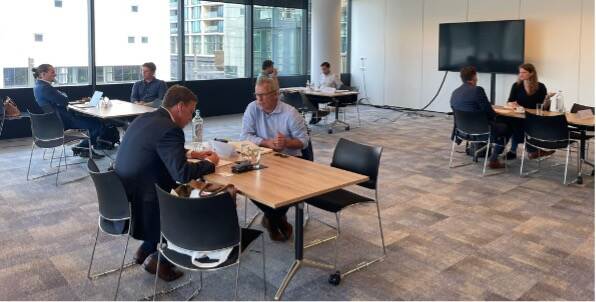
Speaking day
As part of the East-South Africa Agri Forum, the NABC held a “speaking day” on the 7th of June in World Trade Center in Utrecht. The full day program (09:00-17:30 CEST) offered Dutch companies a chance to have individual talks, each lasting 30 minutes, with the Dutch Agricultural Counsellors. The speaking day consisted of pre-booked matchmaking meetings and each Agricultural Counsellor had 11 meetings in total. Quite a few companies with ambitions to newly enter the East and South African markets were among the participants.
All in all very vibrant events that might be repeated because of the great interest.